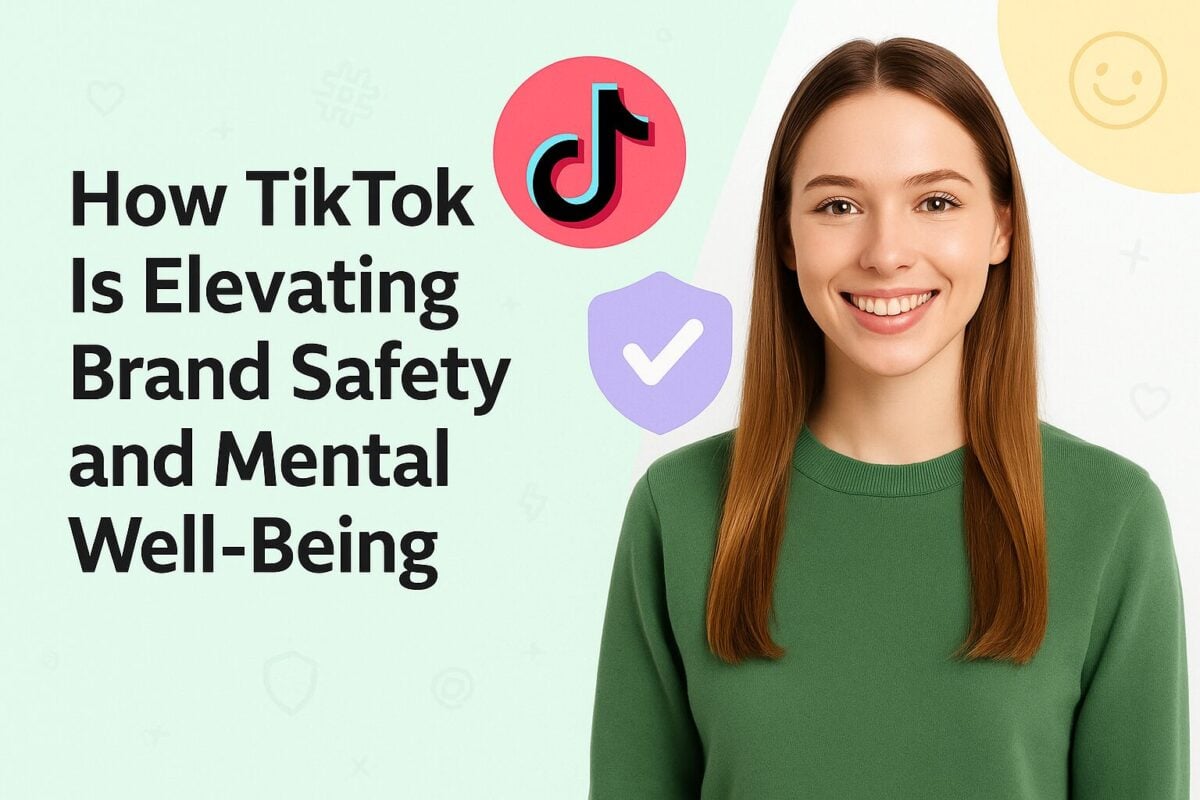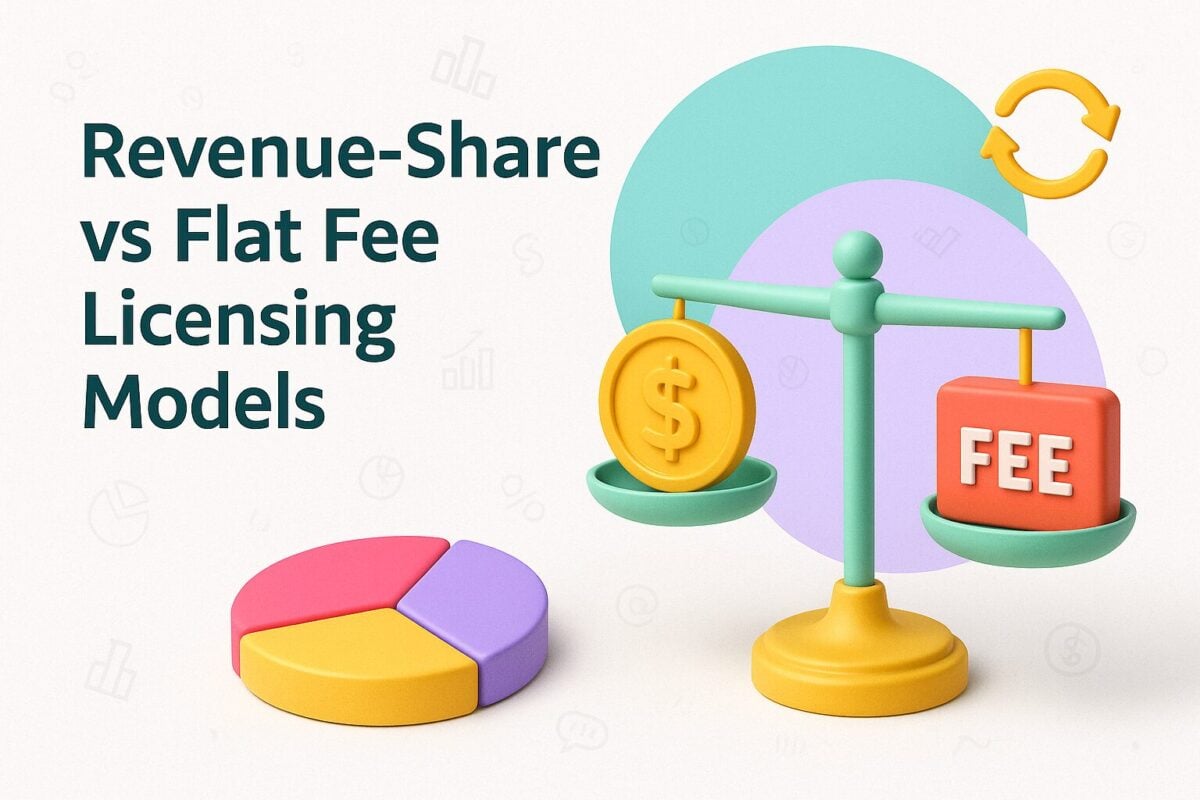Our data shows that there are over 3 million active podcasts and 41% of the US population listens to podcasts at least once a month. With such impressive numbers, it's no secret that this type of media format is becoming hugely popular.
But the impressive rise of podcasts also casts doubt over the means to promote your podcast. What should new podcasts do for promotions? Should they collaborate and make guest appearances? What about ads? These are all questions many up-and-coming podcasts have.
And we're here to give you the rundown of how to promote your podcast. We've put together this podcasting marketing guide to give new podcasters a great starting place and veteran podcasters a refresher or update on podcast marketing.
Before we get started on our guide to podcast marketing, let's take a look at what a podcast is as well as some reasons why you're on the right track if you're looking to start a podcast or grow one.
What Is a Podcast?
A podcast is a digital audio program that you can listen to on-demand, much like a radio show but available whenever you want. You can subscribe to podcasts and receive new episodes automatically.
Key Features of Podcasts
- Format: Podcasts typically consist of a series of episodes focused on specific themes, such as technology, health, or storytelling.
- Accessibility: You can listen to them on various platforms like Spotify, Apple Podcasts, or dedicated podcast apps.
- Variety: Content can range from interviews and discussions to storytelling and educational segments.
Podcasts are a flexible and engaging way to consume content, making them a popular choice for millions of listeners worldwide.
What Is Podcast Marketing?
Podcast marketing refers to the strategies and tactics used to promote and grow your podcast audience. It involves leveraging various channels and techniques to attract new listeners and keep your existing audience engaged.
Effective podcast marketing requires a combination of consistent content creation, strategic promotion, and audience engagement. By focusing on these three, you can grow your podcast's reach and build a loyal community of listeners.
Why Start a Podcast?
We already gave you the crucial podcast statistics. But what about other, practical reasons to start a podcast? Starting a podcast can be a rewarding endeavor for various reasons. Here are some compelling benefits to consider:
1. Global Reach and Audience Growth
With a podcast, you have the opportunity to reach a global audience. Your content can attract listeners from diverse backgrounds and locations, giving you limitless growth potential.
2. Creative Expression
Podcasting provides you with a platform to express your ideas and creativity. Whether you want to share stories, discuss topics you’re passionate about, or interview interesting guests, a podcast allows you to showcase your unique voice and perspective.
3. Building a Community
Podcasts foster deeper connections with your audience. By engaging with listeners through your content, you can create a loyal community that shares your interests and values, enhancing listener engagement and retention.
4. Convenience and Accessibility
Your listeners can consume podcasts anytime and anywhere—whether they are commuting, exercising, or relaxing at home. This convenience makes podcasts a popular choice for busy individuals seeking to absorb information effortlessly.
5. Establishing Authority
Hosting a podcast can position you as an expert in your field. By consistently sharing valuable insights and knowledge, you can build credibility and trust with your audience, opening doors to further opportunities in your niche.
6. Monetization Opportunities
As your podcast grows, you can explore various monetization options, such as sponsorships, affiliate marketing, or merchandise sales. Even a niche audience can be valuable for generating income through targeted advertising and partnerships.
7. Ease of Entry
Starting a podcast is relatively straightforward and doesn’t require a significant budget. With basic recording equipment and editing software, you can launch your show and begin sharing your content with the world.
All in all, podcasts are a huge market and an excellent way to reach people who are ready to buy. According to Shopify, 81% of podcast listeners have taken action after hearing a podcast ad, and 54% claimed that they are most likely to buy something after they've heard about it on a podcast ad. If you're interested in getting more eyes on your brand, increasing brand affinity, and growing sales, podcasting is a great option.
Podcast Marketing Guide for 2024
While podcast marketing doesn't have a "one size fits all" approach, there are several podcast marketing strategies you can use as a starting point to growing your podcast's reach. Before we get into the 19 podcast marketing strategies we love for 2024, there are a couple of things to keep in mind. First, no matter which podcast marketing strategies you choose to use, your focus should be on your audience. Second, testing is your friend.
Who Are You Trying to Reach?
Not everyone is going to love your podcast, and that's okay. Instead of trying to market to a broad audience, focus on getting more high-intent listeners who will get the most benefit from your content.
Yes, you want to have as many listeners and subscribers as possible but if those listeners and subscribers aren't contributing to your bottom line in some way, either through purchasing from your affiliate marketing relationships or by purchasing your products and services, they're not really worth having.
Before you start adopting tips from this podcast marketing guide, really think about who you're trying to reach. Where do they hang out online? What type of content do they enjoy? What products and services will they find useful?
Knowing exactly who you're trying to reach will make it a lot easier to create and promote podcast episodes that educate, entertain, and drive your listeners to act.
What's Working and What Isn't?
Like everything having to do with marketing, podcast marketing isn't a "set it and forget it" thing. You have to test, analyze, tweak, and optimize to make sure you're giving your podcast subscribers exactly what they want. Test everything and adjust your podcast marketing tactics based on what you learn.
19 Podcast Marketing Strategies for 2024
We could write an entire book on all of the different ways to promote a podcast. For this podcast marketing guide, we've chosen 19 podcast marketing strategies we think will work for 2024 and beyond. Let's dive in!
1. Understand Your Why
Before you start a podcast or create a new podcast episode, it's important to understand why. Why this podcast? Why this episode? Figure out what need you're trying to fill and how you'll measure your success. Are you going to focus on the number of downloads, backlinks, and the number of sales you make through your affiliate marketing efforts?
Taking the time to figure out what you want to achieve and how you're going to know if you've achieved it will make your podcast and podcast episodes more cohesive and targeted.
2. Create Great Content
Remember that podcast statistic from earlier? There are more than 3 million podcasts. That's a lot of competition. If you want to get more listeners and grow your reach, you need to create stellar podcast content and promote it well. But what goes into creating great content?
- Equipment: At a minimum, we recommend getting a decent microphone, editing software, and call recording software (for guests).
- Stories: Stories create neurological responses in our brains, creating empathy with the storyteller. Plus, they're easier to remember.
- CTA: Tell your listeners what they should do next with a powerful call to action. This helps move them through your marketing funnel.
While there's a lot more that goes into creating a great podcast episode, these three criteria will get you off to a great start.
3. Take Time to Craft Your Titles and Descriptions
Your podcast and episode titles and descriptions are the first things your target listeners will see and what will let them know if your podcast is for them or not. Your podcast title should let listeners know on a high level what your podcast is about.
Then, in your podcast description, you can expand on what type of content listeners can expect. Here's an example from Chalene Johnson's Build Your Tribe podcast:
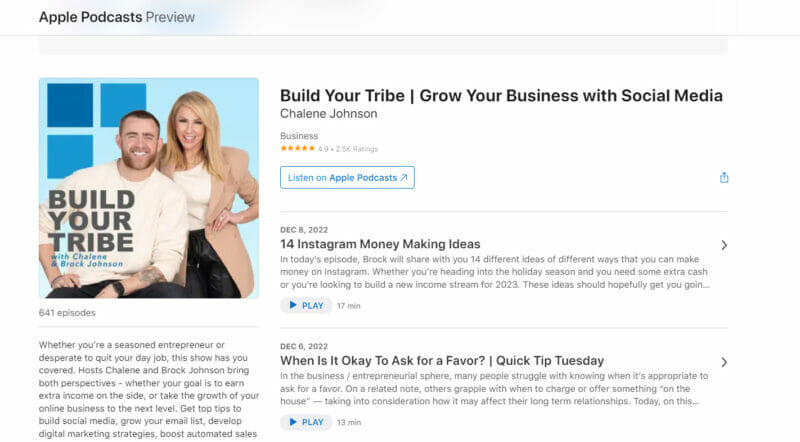
Source: podcasts.apple.com
It's also important to create titles and descriptions for each episode. There are so many podcasts out there that just title their episodes as the episode number. This doesn't tell listeners anything about what the episode is going to cover.
Would you be more likely to listen to a podcast episode titled "Episode 39," or one titled "Episode 39: The One Thing You Need to Do to Get More Listeners?" Here's an example of a great episode title and description:
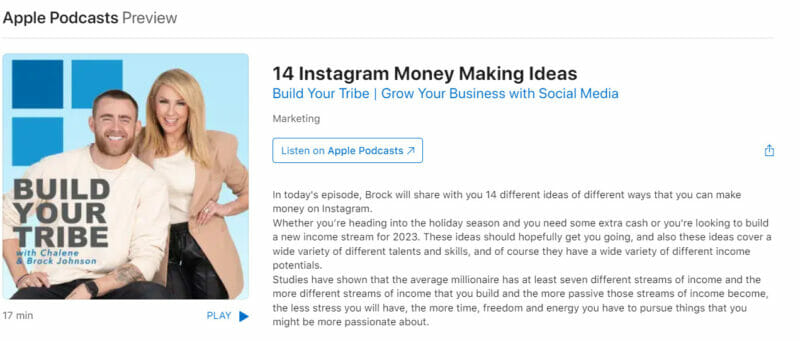
Source: podcasts.apple.com
4. Launch With a Few Episodes
If you're just starting your podcast, you should release a few episodes as soon as you launch. Most podcasting experts recommend launching between five and ten episodes so you have a better chance to hook listeners. If you just have one episode available, listeners have no reason to subscribe. And, if they don't subscribe they won't know when you release more episodes.
If you have a few episodes available, listeners can then binge on your content and are more likely to subscribe so they don't miss future episodes. Plus, your podcast looks serious if it has more than one episode available.
5. Start or Update Your Website
If you don't already have a website, we highly recommend starting one and starting a blog. Website and blog content is easily shareable and attracts a different audience than your podcast alone. This means you can reach people for your podcast using your blog and vice versa.
Depending on the podcast host you're using, you can easily host your podcast content on your own website instead of using the basic website included in your podcast hosting. If you're not keen on hosting your podcast on your own site, you can probably still embed your podcast content on your site to keep everything centralized to maximize your website's impact.
Amy Porterfield has a landing page on her website with everything a listener could ever want to know about the podcast:
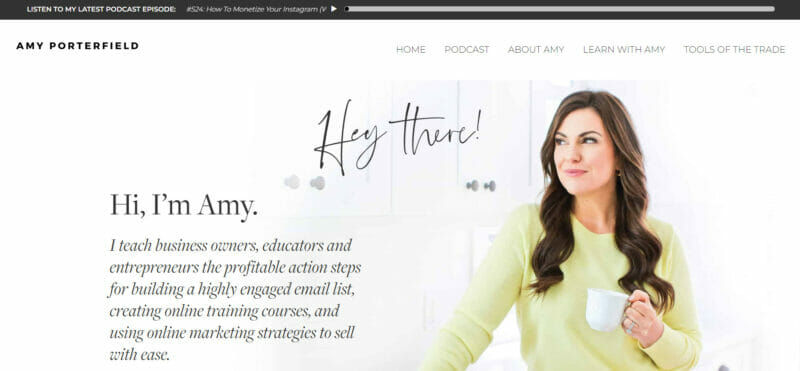
Source: amyporterfield.com
In addition to your blog, you'll also want to include a few standard pages and elements on your website. One of the most important pages to include on your website is a descriptive About page where you tout the benefits of your brand, products, services, and podcast, encouraging people to listen and subscribe.
Your About page shouldn't just be a laundry list of benefits but instead should center your target audience and talk about the benefits in terms of how they will make the lives of your audience better.
6. Optimize for SEO
Both your website and podcast titles and descriptions can be optimized for search. One of the easiest ways to do podcast SEO is by optimizing your podcast episode titles and descriptions to include the keywords your target audience is likely to use when searching for the content you're covering.
Podcast SEO is very similar to YouTube SEO and you can learn how to create better podcast episode descriptions by using these tips to create better YouTube video descriptions.
7. Start an Email Newsletter
Email marketing has the best ROI of all digital marketing channels at 4400%. This means that for every $1 you spend on email marketing, you have the potential to earn $44. If you don't already send out an email newsletter, you should definitely start.
Your email newsletters are a wonderful place to share new podcast episodes, ask your audience to subscribe, and more. You'll want to take steps to grow your email list as well as choose the best email marketing service for your business to get the highest return on your email marketing campaigns.
8. Submit to Podcast Directories
Another quick and easy way to market your podcast is by adding it to podcast directories and aggregators. There are several podcast directories and aggregators to choose from:
- Google Play
- Apple Podcasts
- iHeartRadio
- Stitcher
- Spotify
- SoundCloud
- TuneIn
- Podbay
- Podtail
You can create accounts on these platforms and submit your RSS feed so your new episodes are automatically published to each platform allowing you to reach a broader audience.
9. Publish New Episodes at the Right Time
Just as it's important to find the best time to publish on social media, it's important to publish your podcast episodes at the right time, too.
If you're just getting started, you can look at podcasts similar to yours to find out when they publish their new episodes. That's a good place to start. Once you have your own data about when people listen to your podcast episodes, you can start posting closer to that time.
10. Engage Your Listeners
Podcasting is a one-way medium but that doesn't mean that you can ignore your listeners. You absolutely have to engage your listeners if you want to have a successful podcast. Include calls to action for your listeners so they know what action to take after listening to your podcast.
This might mean asking them to subscribe to your podcast, share it, or leave a review. But you can't just ask. You have to make it beneficial to the listener. Why should they subscribe, share, or leave you a review (hint: this helps your podcast grow and enables you to produce even better content over time)?
11. Schedule Guests
No matter how sparkling your personality, your listeners are probably going to want to hear from other experts, too. If it makes sense for your podcast, you can invite guests to your podcast.
This not only builds trust and social proof but potentially gives you access to the guest's audience if they share the episode with their audience. As your podcast gains attention, you'll be able to invite bigger names onto your podcast, giving your audience access to their expertise and giving your guest access to your audience.
12. Appear on Other Podcasts
The flip side of inviting guests to your podcast is making appearances on other podcasts. This gives you the chance to reach a new audience and form associations with other thought leaders, experts, and influencers which will increase your credibility.
Don't just wait for others to reach out to you. Research podcasts with an audience that overlaps with yours and pitch them a couple of topics that you can share with their audience. With your pitch, include any reasons you're worth including as a guest to show them that you can bring value to their audience. You can find podcasts with overlapping audiences from Apple Podcasts by scrolling down:
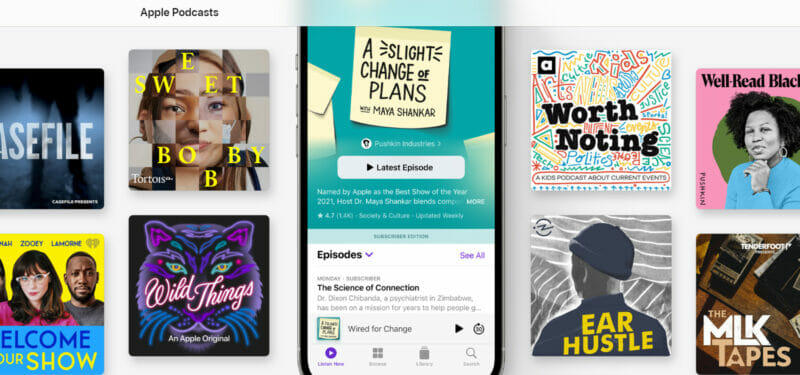
Source: apple.com
13. Host a Giveaway
Giveaways have the potential to go viral, making them a great way to market your podcast. You can give away just about anything, but it's best if your giveaway relates to your brand and the products and services you offer. For example, if your podcast is about starting or building a new business, you might give away a free consultation.
While it may be tempting to give away something like an Amazon gift card or a vacation, it's best to stick with giveaways that match your brand. The more generic your giveaway, the more signups you'll get from people who aren't really interested in your products and services—they just want to win.
We recommend using an online giveaway tool like Rafflecopter, Gleam, or RafflePress to create your online giveaway quickly and easily.
14. Leverage Influencer Marketing and Partnerships
Influencer marketing is the practice of using influencers to market your podcast to new, related audiences. Look for an influencer with an audience that overlaps your target audience and reach out to them. You can also reach out to other brands for collaborations and partnerships.
While it may seem counterintuitive to reach out to podcasters covering similar topics, it's important to remember that podcasts can be consumed at any time—just because someone is listening to a different podcast now doesn't mean that they've missed out on your podcast.
There are several ways to collaborate with other podcasters like promo swaps, content collaboration, co-hosting episodes, montage episodes, and more.
15. Reach Out to People and Brands You Mention
If you're mentioning someone in your podcast, reach out to them and let them know. Send them a link that they can share on their social media platforms so they can easily share the episode with their audience. This is an easy way to get a mention from popular people and brands in your industry or niche.
16. Promote Your Podcast on Social Media
Social media is a great way to share your podcast episodes and generate more interest in your podcast. But you can't just pop in, share a link to your latest episode, and leave. Social media is social, after all. That means that you need to actively engage on the platforms where your target audience hangs out. Yes, you can post a link to your latest episode, but you also need to talk to your followers and share other interesting information.
One of our favorite ways to generate interest in podcast episodes and tease new content is using audiograms. Audiograms are mini videos that are much more engaging than a text-based snippet of your podcast:

Source: getaudiogram.com
You'll also want to customize your posts for each social media platform. The audiograms we just talked about work well on Instagram and Facebook but probably wouldn't be nearly as engaging on something like Twitter.
17. Repurpose Your Podcast Content
After you've published new episodes, you can repurpose that content to promote your episodes across social media platforms. We've already talked about audiograms but there are several other ways you can repurpose your content:
- Create a blog post to accompany your podcast episodes
- Create graphics using the best quotes from your episodes
- Condense the main points of your episode into an infographic
- Turn your podcast episodes into YouTube videos
18. Use Your Back Catalog
Over time, you're going to have more and more podcast episodes. These are a goldmine when it comes to pulling in new subscribers and getting listeners to engage with more of your podcast content.
When you mention a topic that you've talked about in a previous podcast episode, be sure to include the episode number and a little blurb about why your listeners should give it a listen. Then, link to the episode in the show notes.
19. Run Paid Ads
The podcast marketing tips we've shared to this point are excellent ways to draw attention to your podcast organically. This can take some time. If you want to fast-track your podcast's popularity, you might want to consider paid ads. Running ads is a great way to boost growth quickly, while your organic efforts are taking hold.
There are tons of options for running paid ads. Depending on your audience, you might want to run Facebook ads, Google ads, LinkedIn ads, or focus on other avenues such as advertising on podcast apps like Overcast, Listen Notes, or others.
Wrapping Up
There you have it! This podcast marketing guide will help you take your podcast from just starting out to a must-listen. It's important to remember that podcast marketing is a test-tweak-analyze process. Try using one or two of the podcast marketing strategies from our list and pay attention to how they work before adopting additional strategies. Before long, you'll have a popular podcast that increases your brand's reach and boosts your bottom line.
Frequently Asked Questions
Why should I start a podcast?
Starting a podcast is a great way to reach a large audience, build brand affinity, and drive sales. Podcasts are a popular medium for entertainment and education, with 62% of US consumers listening to audio podcasts. Additionally, 81% of podcast listeners have taken action after hearing a podcast ad, making it a powerful tool for marketing your products or services.
What are the key elements to creating great podcast content?
Great podcast content includes having the right equipment, telling engaging stories, and incorporating powerful calls to action (CTA). You'll need a decent microphone, editing software, and call recording software for guest interviews. Engaging stories help create empathy with listeners, and CTAs guide them on what to do next, moving them through your marketing funnel.
How can I increase the visibility of my podcast?
To increase your podcast's visibility, you can use several strategies:
- Submit your podcast to directories and aggregators like Google Play, Apple Podcasts, Spotify, and others.
- Promote your podcast on social media and engage with your audience.
- Appear as a guest on other podcasts to reach new listeners.
- Use SEO techniques to optimize your podcast titles and descriptions for search engines.
- Run paid ads to boost your podcast's growth quickly.
What should I consider before launching my podcast?
Before launching your podcast, understand your goals and target audience. Launch with a few episodes (between five and ten) to give listeners more content to binge, increasing the chances they'll subscribe. Also, start or update your website to include your podcast content and provide additional value through a blog and other resources.
How do I engage with my podcast listeners?
Engaging with your listeners is crucial for building a successful podcast. Include calls to action in your episodes, asking listeners to subscribe, share, or leave reviews. Schedule guests to bring new perspectives and appear on other podcasts to reach new audiences. Additionally, consider hosting giveaways and leveraging influencer marketing to attract more listeners and foster a community around your podcast.

